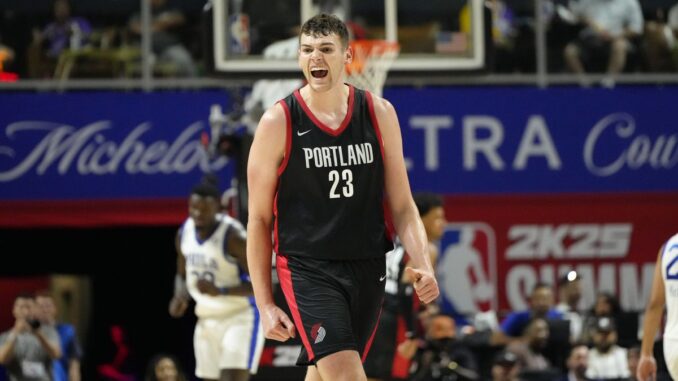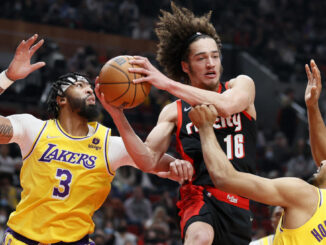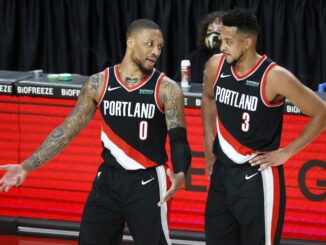
With only five games to showcase a player’s talents in the NBA Summer League, they must ensure every minute counts. Any mistake can make them undesirable to an NBA team in a snap. The Summer League separates the players who are NBA-ready and those who aren’t, mentally and physically.
And after the Portland Trail Blazers’ Summer League performance, the line between these two groups becomes more apparent.
Portland’s up-and-coming players had a difficult time in Las Vegas, ending the Summer League with a 3-2 record. However, the expected stars emerged strong, showcasing that they can be ready for the NBA with a little bit of time.
Center Donovan Clingan’s first game for Portland was unsatisfactory, with only four points compared to his collegiate average of thirteen. However, his defensive play made up for the lack of points as the games progressed. And as the week progressed, so did his point production. By Friday’s game against the Charlotte Hornets, Clingan tallied 16 points, 12 rebounds, and 4 blocks in a single game.
Portland coach Chauncey Billups said his defensive instinct and ability make Clingan vital to the Blazers roster. His height obviously helps with this, standing tall at seven-foot-two, but his rim protection fills the gap in Portland’s current roster. Additionally, Clingan set the record for blocks per game over the four Summer League games he competed in, averaging 4.2.
Although Clingnan didn’t play in the final game against the Houston Rockets, he didn’t need to — he had already proved his spot on the roster and showcased why he was the seventh-overall pick in the 2024 NBA Draft. He was voted on the All-Summer League Second Team.
The Blazers got destroyed by Charlotte, falling 68-84, but the important thing to note is the increased point production across the top players. Clingnan and Bryce McGowens clinched 16, and Kennedy Chandler was close behind with 15. Even Olivier Nkamhoua, who didn’t get a single minute in the first two games, tallied eight.
By the final game against Houston, with no Clingnan to rely on around the rim or from the three-point line, the rest of the roster needed to showcase their skills. At the end of the first quarter, it looked like the Rockets were going to pull a stunt similar to the Hornets, as they outscored Portland 27-to-20. But in the second quarter, a fire lit under the Blazers’ feet. Realizing they needed to improve, they scored 28 points in the second, holding Houston to a mere 13.
Portland was able to maintain a lead and a sizable one, thanks to the roster working as a team, not as individuals. Four of the five starters ended the game with double-digit points, with the bench players following suit. Without Clingan, Nkamhoua was able to snag six blocks of his own — half of the team total. Merely two days before against Charlotte, Terquavion Smith came off the bench and scored no points in his ten minutes of play. But against the Rockets, he turned that narrative around, scoring the third-most points for the Blazers.
By the final game against Houston, it was evident that the rookies were starting to get a groove in their game. Kris Murray scored 20 points, his best of the tournament, and Chandler led the charge with 21, utilizing his speed against the Rockets.
Portland’s up-and-coming players have potential, as showcased in the Summer League. However, the Blazers aren’t expected to drastically turn around from their abysmal 2023-24 season. They’re still not expected to make the playoffs and will chart at the bottom of the rankings once again.
Billups is trying to build his team, a group of young talent he can invest time and effort into and be proud of the team he cultivated. When Damian Lillard was traded, it served as a statement that it was a new era for Portland, one where his roster doesn’t rely on its star power. But if that’s the new plan, they need to gain the young talent as soon as possible and build them up. While some players on this Summer League team have potential for growth, others have a long way to go before they see an NBA court.




